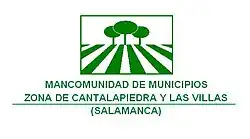
In present-day Spain a mancomunidad (English: municipal association [note 1]) is an association of municipalities voluntarily established by some municipalities with the aim of carrying out joint projects or providing common services.[1][2]
A mancomunidad is one of the local entities[3] defined for the purpose of local government, to which those municipalities may voluntarily delegate some of their functions and powers. There were 1,023 mancommunidades in 2011.[4]
Purpose
In general, mancomunidades are aimed at carrying out projects or providing common services.[1][5]
A mancomunidad has legal personality, and can exist either for a particular period to achieve a concrete goal or can exist indefinitely.
A mancomunidad is similar to a comarca, with the difference that comarca has somewhat different meanings in the various autonomous communities of Spain and mancomunidad is defined identically throughout the country. The municipalities in a single mancomunidad need not be coterminous (though they usually are). They are required to set a clear goal, create management bodies distinct from those of the individual municipalities, and provide the mancomunidad with its own budget.
There are a number of natural or historical regions that, despite the strong identity and common goals of their inhabitants, are divided by provincial or even ancient kingdom boundaries. Examples of such regions are Tierra de Campos, Manchuela and Ilercavonia. Such regions or comarcas have often not been able to achieve the necessary legal recognition for their administrative development within the existing provincial or autonomous frameworks. Therefore, their municipalities have resorted to organizing themselves into a mancomunidad.[6]
Other groups of municipalities that do not face the problem of borders cutting across their natural region or comarca may form a mancomunidad for economic reasons, to improve local services or in order alleviate some form of historical administrative neglect owing to distance from and lack of communication with current administrative centers.[7]
Other uses
The term mancomunidad and its cognates are also used to translate the English word "commonwealth".
Notes
References
- 1 2 Cools & Verbeek 2013, Explanatory Memorandum, paragraph 32 on page 10.
- ↑ Mancomunidades en España Archived 2010-07-01 at the Wayback Machine
- ↑ Local Government Act 1985, Article 3.
- ↑ Colino & del Pino 2010, p. 364.
- ↑ Colino & del Pino 2010, p. 363.
- ↑ Mancomunidad de Tierra de Campos
- ↑ "Mancomunitat Intermunicipal de la Vall del Tenes". Archived from the original on 2011-08-28. Retrieved 2010-10-22.
Bibliography
- Colino, César; del Pino, Eloísa (2010). "Spain: The consolidation of strong regional governments and the limits of local decentralisation". In Hendriks, Frank; Lidström, Anders; Loughlin, John (eds.). The Oxford Handbook of Subnational Democracy in Europe. Oxford University Press. pp. 356–383. doi:10.1093/oxfordhb/9780199562978.001.0001. ISBN 978-0199562978.
- "Local Government Act, Organic Law 7/1985" (in Spanish). Agencia Estatal Boletín Oficial del Estado. 1985. Retrieved 12 June 2022.
- Cools, Marc; Verbeek, Leen (19–21 March 2013). Local and regional democracy in Spain. Council of Europe.
- Spanish Ministry of Economic Affairs and Digital Transformation. "Register of Local Entities". Local Entity Portal (in Spanish). Retrieved 10 June 2022.
External links
- (in Spanish) Mancomunidades in Spain, interactive map.
- Mancomunidad Tierra de Caballeros
- Web Mancomunidad Terra de Celanova